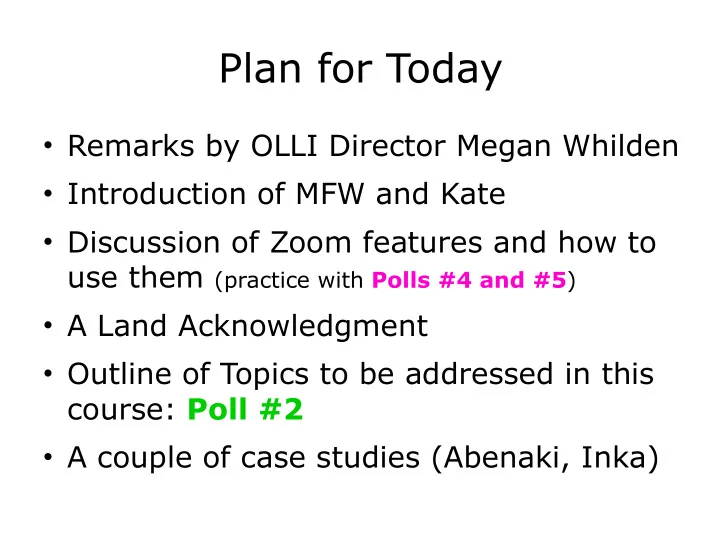

Plan for Today ● Remarks by OLLI Director Megan Whilden ● Introduction of MFW and Kate ● Discussion of Zoom features and how to use them (practice with Polls #4 and #5 ) ● A Land Acknowledgment ● Outline of Topics to be addressed in this course: Poll #2 ● A couple of case studies (Abenaki, Inka)
Michael Forbes Wilcox olli@mfw.us Born and Raised in Stockbridge Active in Civil Rights Movement and in the Vietnam Anti-War Movement MA in Economics, Trinity College CFA (Chartered Financial Analyst) – Quantitative Professional Career included: 11 years in the Hartford area: IT/Finance ● 12 years on Wall Street (Principal, Morgan Stanley) ● Founder of QWAFAFEW ● 2 years money management State Street Boston ● several years independent research/consulting/expert witness ● Political Organizer and Disability Rights Advocate (Massachusetts Special Commission Relative to Autism, Boards of AANE, Autism Connections) Currently Alford Town Moderator, formerly on the Board of the Massachusetts Moderators Association
A Land Acknowledgment We will begin (each time) with a land acknowledgment. I am speaking from Alford. Please adapt the sentiments here to your own locale. I would be glad to provide details to anyone wishing to personalize this concept. Key words: Muhheconneok, Muhheconnituck, Pitawbagok, Podunk, Seekonk, Seg8gw, Algonkian, moz, Indiantown, Shawenon, Greenland Grant, Anushiik (Munsee), Oneewe (Mohican), Wliwni (Abenaki) https://northstarcasinoresort.com/news/temporary- closure-notice
M103 Indigenous Cultures in the Berkshires and Beyond NB: The themes listed on this and the next slide are interwoven into our “case studies” and will mostly be explored via these examples 1491: New Revelations of the Americas Before Columbus ● People arrived in the Americas earlier than had been thought Poll #6 ● There were many more people in the Americas than in previous estimates ● American cultures were far more sophisticated than had been believed ● Environmental management was widespread and hugely impactful (belying the concept of “ wilderness ”)
Some of the other things we will talk about Please put in the Q&A any comments about your preferences and suggestions (including resources you would recommend) Changes in the Land Case Studies Language Lewis Henry Morgan Indigenous Values: religious beliefs, myths, and story-telling The History of Balance Exchange of Values The Little Ice Age Lost Opportunity
Issues Raised/Implied in the Land Acknowledgment Exonym versus Endonym (Mohican/Muhheconneok) [Muhheconneew] another example: Haudenosaunee 1755 Massachusetts/New York Border Population Die-Off from Disease Private Property /Usufruct Rights Woodlands Management Language/Dialects and Tribal Boundaries Orthography: Skunk = seg8gw | segȏgw
In no particular order... Language There was no word for time or clock in the Abenaki Language and so our ancestors came up with a word for clock. Papulkweezultozik which means “that thing which makes much noise but does nothing at all of any real use.” Judy Dow [pizwiwi = useless] The concept of time was related to the accumulation of change. Since Indian languages were oral, and (for the most part) had no written records, and some dialects died out, we rely on colonial documents that attempted to record what they heard. The European orthography, naturally enough, reflects the way they write their own language sounds. In New England, as the English pushed north and confiscated Abenaki lands, the Native people fled north and west, many of them ending up in what is now Canada. The French were more welcoming of the Indians, often living among them and even inter-marrying, and attempted to understand their culture, even as they tried to save their souls by converting them to Christianity. So early Abenaki dictionaries and grammars were written in the French style. In contrast, many of the documents that record other Algonkian dialects, those along the Eastern seaboard, use English-style orthography. In trying to find cognates between Abenaki and Mohican, for example, I find that I have to say the words out loud in order to comprehend whether they might be the same word, even if altered slightly, because the spellings are so different that at first glance they seem to have no similarity. I'll give some examples later.
People arrived in the Americas earlier than had been thought Laurentine Glaciation ● Our part of the “New World” was inhabited before parts of northern Europe ● More of the Continental Shelf was exposed “History is written by the victors” ● What was Holmberg's Mistake? Poll #3 ● Who controlled the narrative that we (of European descent) have come to know? [rhetorical question!]
Recommend
More recommend